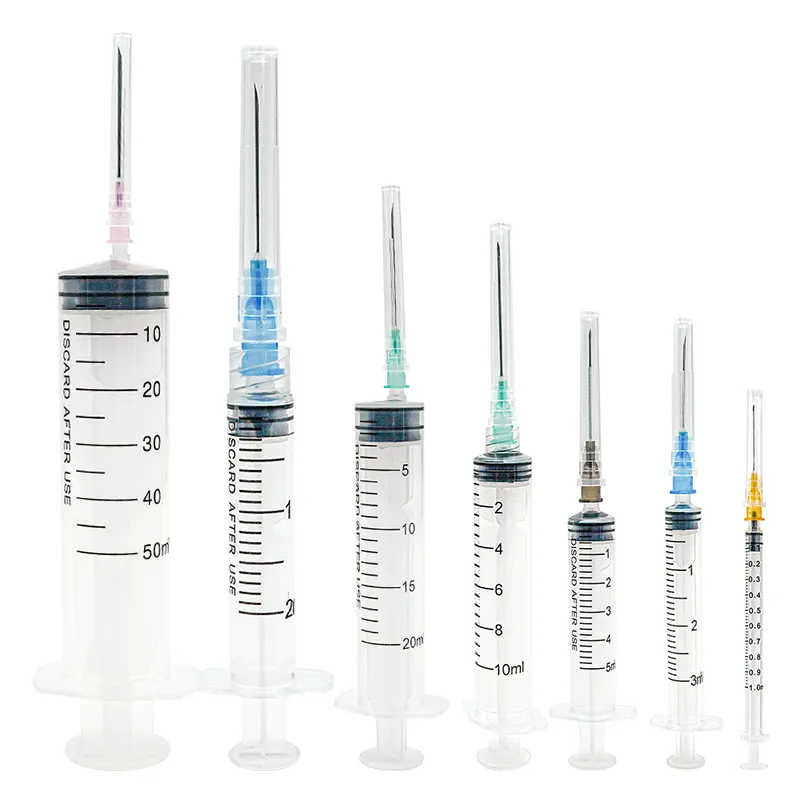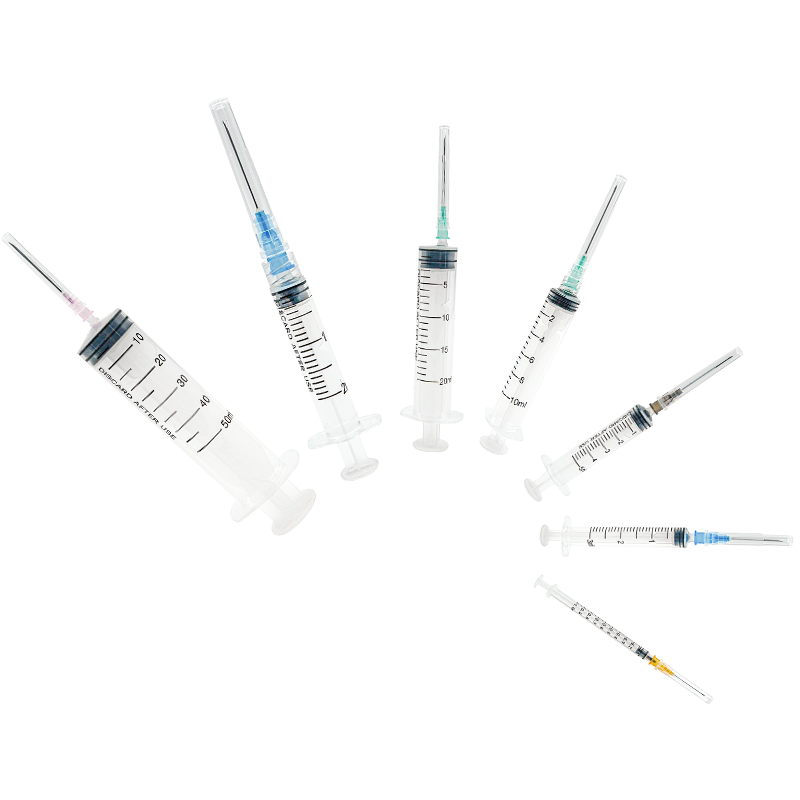Pag-unawa sa Modernong Medikal na Injection Device
Mga syringang pang-iniksyon ay isa sa mga pinakapundamental at maraming gamit na kasangkapan sa modernong pangangalagang pangkalusugan. Ang mga instrumentong may kawastuhan na ito ay nagsisilbing pundasyon ng paghahatid ng medikal na paggamot, mga prosedurang pangdiyagnosis, at mga interbensyong pangterapiya sa lahat ng mga setting ng pangangalagang pangkalusugan. Mula sa mga ospital at klinika hanggang sa mga tahanan na may pangangalaga, ang mga syringang pang-iniksyon ay naglalaro ng mahalagang papel sa pagsisiguro ng tumpak at ligtas na pagbibigay ng gamot.
Ang ebolusyon ng mga syring na iniksyon ay radikal na nagbago mula nang maisip ito, na isinasama ang mga advanced na materyales, mas mahusay na mga tampok para sa kaligtasan, at mapabuting disenyo. Ang mga modernong propesyonal sa medisina ay umaasa sa mga instrumentong ito upang maibigay ang mga gamot na nagliligtas-buhay, makalap ng mahahalagang sample para sa diagnosis, at maisagawa ang iba't ibang prosedurang medikal nang may di-kasunduang tiyak na presisyon.
Mahahalagang Aplikasyon sa Klinikal na Paligid
Paggamit ng Gamot at Paggamot
Sa mga klinikal na kapaligiran, ang mga syring na iniksyon ay nagsisilbing pangunahing kasangkapan sa pagbibigay ng iba't ibang gamot. Ginagamit ng mga tagapagbigay ng pangangalaga ng kalusugan ang mga device na ito upang mag-administer ng bakuna, antibiotiko, gamot para sa pananalit, at iba pang terapeútikong sustansya. Ang tumpak na kalibrasyon ng mga syring na iniksyon ay nagsisiguro ng eksaktong dosis, na napakahalaga para sa kaligtasan ng pasyente at epekto ng paggamot.
Maingat na pinipili ng mga propesyonal sa medisina ang angkop na sukat at uri ng syringe batay sa tiyak na pangangailangan sa gamot, paraan ng ineksyon, at pangangailangan ng pasyente. Mula sa subcutaneous hanggang intramuscular na ineksyon, nangangailangan ang bawat aplikasyon ng wastong teknik at protokol sa kaligtasan.
Mga Pamamaraan sa Diagnosis at Pangongolekta ng Sample
Higit pa sa pagbibigay ng gamot, mahalaga ang papel ng mga syring para sa mga pamamaraan sa diagnosis. Ginagamit ng mga manggagamot ang mga instrumentong ito upang kumuha ng dugo, isagawa ang fine-needle aspirations, at makakuha ng tissue specimens para sa pagsusuri sa laboratoryo. Ang tumpak na disenyo ng modernong injection syring ay nagbibigay-daan sa kakaunting kahihinatnan sa pasyente habang tinitiyak ang maaasahang pangongolekta ng sample.
Sa mga espesyalisadong pamamaraan tulad ng arthocentesis o spinal taps, umaasa ang mga healthcare provider sa partikular na uri ng injection syringe na idinisenyo para sa mga sensitibong operasyon na ito. Nangangailangan ang mga pamamaraang ito ng lubhang tumpak at malinis na proseso, kaya naman mahahalagang kagamitan ang mga de-kalidad na syringe.
Mga Dalubhasang Medikal na Pamamaraan
Mga Aplikasyon sa Pangangalaga ng Ngipin
Madalas gamitin ng mga propesyonal sa dentista ang mga syring para sa panglokal na anestesya at iba't ibang prosedurang dental. Ang mga espesyalisadong syring na ito ay kadalasang may natatanging disenyo na optimisado para sa maayos na pagpasok sa oral cavity at tumpak na paghahatid ng mga ahente ng anestesya. Ang kontrol at katumpakan na ibinibigay ng mga instrumentong ito ay nagsisiguro ng komport ng pasyente habang isinasagawa ang mga paggamot sa ngipin.
Gumagamit din ang mga modernong klinika ng pangangalaga ng ngipin ng mga syring sa mga prosedurang tulad ng root canal, pagtrato sa periodontal, at kosmetikong dentistry. Ang versatility ng mga kasangkapan na ito ang nagiging sanhi kung bakit ito mahalaga sa mga setting ng pangangalaga ng ngipin, kung saan napakahalaga ng tumpak na paghahatid ng gamot.
Mga Gamit sa Medisinang Veterinario
Malaki ang pag-aasam ng mga propesyonal sa veterinary sa mga syringang pang-iniksyon para sa paggamot sa mga hayop na may iba't ibang sukat. Mula sa karaniwang bakuna hanggang sa mga emerhensiyang medikal, kailangang kayang-kaya ng mga kasangkapang ito ang iba't ibang uri ng hayop at magkakaibang dami ng gamot. Madalas, ang mga espesyalisadong syringang pang-veterinary ay may matibay na gawaan at nababagay na disenyo upang harapin ang mga natatanging hamon.
Ang larangan ng veterinary ay nangangailangan ng mga syringang pang-iniksyon na kayang humawak sa iba't ibang viscosity ng gamot at mga paraan ng pagbibigay nito, habang nananatiling tumpak at ligtas. Ang mga pangangailangang ito ang nagtulak sa pagbuo ng mga espesyalisadong disenyo at katangian ng syringang pang-veterinary.

Mga Advanced na Aplikasyon sa Pangangalagang Pangkalusugan
Pananaliksik at Gawain sa Laboratoryo
Sa mga laboratoryo ng pananaliksik, ang mga syringang pang-injection ay may maraming gamit bukod sa tradisyonal na medikal na aplikasyon. Ginagamit ng mga siyentipiko at mananaliksik ang mga instrumentong ito para sa tumpak na pagsukat at paglilipat ng mga solusyon, gawaing kultura ng selula, at mga prosedurang eksperimental. Mahalaga ang katumpakan ng modernong mga syringe upang mapanatili ang integridad at muling pagkabuo ng eksperimento.
Madalas nangangailangan ang mga propesyonal sa laboratoryo ng mga espesyalisadong syringang pang-injection na idinisenyo para sa tiyak na aplikasyon sa pananaliksik, tulad ng mikro-injection o kromatograpiya. Ang mga espesyalisadong kasangkapang ito ay may mas mataas na katumpakan at natatanging elemento ng disenyo na nakatuon sa mga pangangailangan sa pananaliksik.
Mga Aplikasyon sa Emergency Medicine
Ang mga serbisyong medikal na pang-emerhensiya ay lubos na umaasa sa mga syringang pang-injection para sa mga sitwasyong nangangailangan ng mabilisang tugon. Ginagamit ng mga unang tumutugon at kawani sa emergency room ang mga kasangkapang ito upang magbigay ng mga lifesaving na gamot, pamahalaan ang sakit, at magpatupad ng mahahalagang interbensyong pangkalusugan. Madalas na binibigyang-priyoridad sa disenyo ng mga syringang pang-emerhensiyang medikal ang mabilisang pag-access at kadalian ng paggamit sa ilalim ng presyon.
Gumagamit ang mga modernong setting ng pang-emergency na pag-aalaga ng iba't ibang espesyalisadong sutsot para sa iniksyon, kabilang ang auto-injector at pre-filled syringes, upang mapabilis ang oras ng tugon at mapataas ang kahusayan ng paggamot. Ang mga inobasyong ito ay malaki ang naitulong sa pagpapabuti ng kakayahan sa pangangalagang medikal sa emergency.
Bahay Mga Aplikasyon sa Pangkalusugan
Pamamahala ng Nakakalumong Sakit
Madalas nangangailangan ang mga pasyenteng namamahala ng mga kronikong kondisyon ng regular na pagbibigay ng gamot gamit ang sutsot sa bahay. Ang mga kondisyong gaya ng diabetes, multiple sclerosis, at ilang mga hormonal disorder ay nangangailangan ng self-administration ng mga gamot. Kasama sa mga modernong sutsot para sa iniksyon na idinisenyo para sa gamit sa bahay ang mga tampok na pangkaligtasan at user-friendly na elemento upang suportahan ang kalayaan ng pasyente.
Malapit na nakikipagtulungan ang mga healthcare provider sa mga pasyente upang matiyak ang wastong pagsasanay sa mga teknik ng pag-iiniksyon sa bahay, tamang pagtatapon ng sutsot, at mga protokol sa kaligtasan. Ang edukasyong ito ay nagbibigay kapangyarihan sa mga pasyente na mahusay na pamahalaan ang kanilang mga kondisyon habang patuloy na sinusunod ang tamang pamantayan sa medisina.
Suporta sa Pag-aalaga sa Bahay
Madalas na ginagamit ng mga propesyonal na tagapag-alaga at miyembro ng pamilya na nagbibigay ng pangangalagang pang-tahanan ang mga syringang pang-iniksyon para sa iba't ibang pangangailangan sa medisina. Ang mga aplikasyong ito ay maaaring isama ang suporta sa nutrisyon, pamamahala ng pananakit, o mga espesyalisadong paggamot. Ang pagkakaroon ng angkop na mga syringang pang-iniksyon at tamang pagsasanay ay tinitiyak ang ligtas at epektibong paghahatid ng pangangalaga sa tahanan.
Ang mga setting ng pangangalagang pang-tahanan ay nangangailangan ng partikular na pagbabantay sa tamang pag-iimbak, paghawak, at pagtatapon ng mga syringang pang-iniksyon. Madalas na nagtatatag ang mga provider ng healthcare ng detalyadong protokol upang mapanatili ang kaligtasan at pagbibigay-kahulugan sa mga kapaligiran sa tahanan.
Mga madalas itanong
Ano ang iba't ibang uri ng mga syringang pang-iniksyon na magagamit para sa medikal na gamit?
Ang mga medikal na syringang pang-iniksyon ay may iba't ibang uri, kabilang ang karaniwang syringe, mga syringang pangkaligtasan, mga syringang pang-insulin, at mga espesyalisadong disenyo para sa tiyak na prosedur. Ang bawat uri ay may iba't ibang sukat ng barrel, gauge ng karayom, at mga mekanismo ng kaligtasan na idinisenyo para sa partikular na aplikasyon sa mga setting ng healthcare.
Paano dapat itago at mapanatili nang maayos ang mga syring na pang-injection?
Ang mga syring na pang-injection ay dapat itago sa malinis, tuyo, at lugar na may temperatura ng kuwarto. Kasama sa tamang pag-iimbak ang pagpapanatiling sterile, pagsusuri sa petsa ng pagkabasa, at pagtiyak sa integridad ng pakete. Ang mga pasilidad sa pangangalagang pangkalusugan ay dapat sumunod sa tiyak na protokol para sa pag-iimbak at paghawak ng syring upang mapanatili ang kaligtasan at epektibidad.
Anong mga katangian ng kaligtasan ang kasama sa modernong mga syring na pang-injection?
Ang mga modernong syring na pang-injection ay may iba't ibang katangian ng kaligtasan tulad ng mekanismo ng pagretract ng karayom, takip ng karayom, at awtomatikong lock na pangkaligtasan. Nakatutulong ang mga katangiang ito upang maiwasan ang mga sugat mula sa karayom, matiyak ang tamang pagtatapon, at mapanatili ang kahigpitan sa buong proseso ng injection.
Paano maayos na itinatapon ang mga syring na pang-injection matapos gamitin?
Ang mga ginamit na syring para sa ineksyon ay dapat itapon sa mga aprubadong sharps container ayon sa lokal na regulasyon at protokol ng pasilidad pangkalusugan. Mahalaga ang tamang pagtatapon upang maiwasan ang mga aksidente at mapanatili ang kaligtasan sa kapaligiran. Dapat sundin ng mga tagapagbigay ng serbisyong pangkalusugan ang tiyak na gabay sa paghawak at pagtatapon ng mga ginamit na syring.
Talaan ng Nilalaman
- Pag-unawa sa Modernong Medikal na Injection Device
- Mahahalagang Aplikasyon sa Klinikal na Paligid
- Mga Dalubhasang Medikal na Pamamaraan
- Mga Advanced na Aplikasyon sa Pangangalagang Pangkalusugan
- Bahay Mga Aplikasyon sa Pangkalusugan
-
Mga madalas itanong
- Ano ang iba't ibang uri ng mga syringang pang-iniksyon na magagamit para sa medikal na gamit?
- Paano dapat itago at mapanatili nang maayos ang mga syring na pang-injection?
- Anong mga katangian ng kaligtasan ang kasama sa modernong mga syring na pang-injection?
- Paano maayos na itinatapon ang mga syring na pang-injection matapos gamitin?

